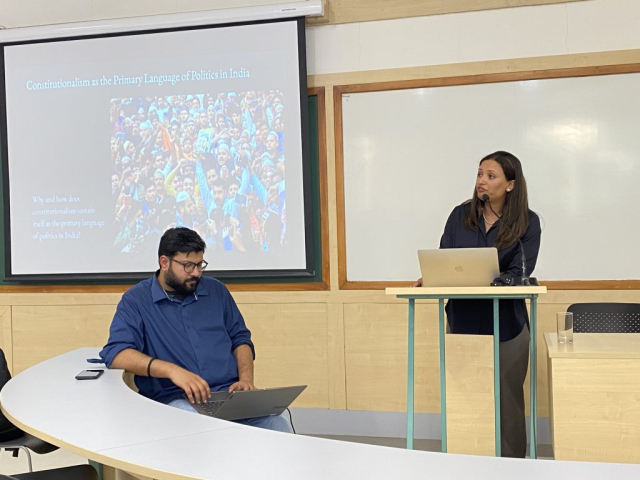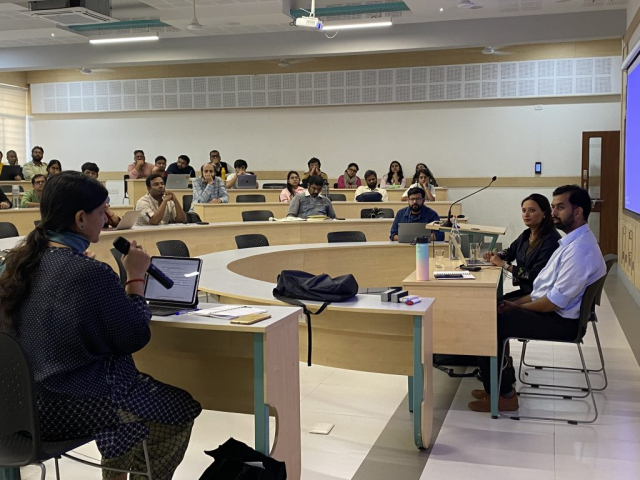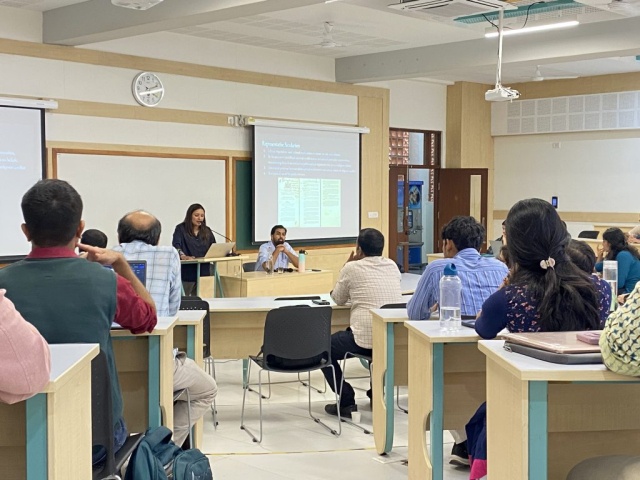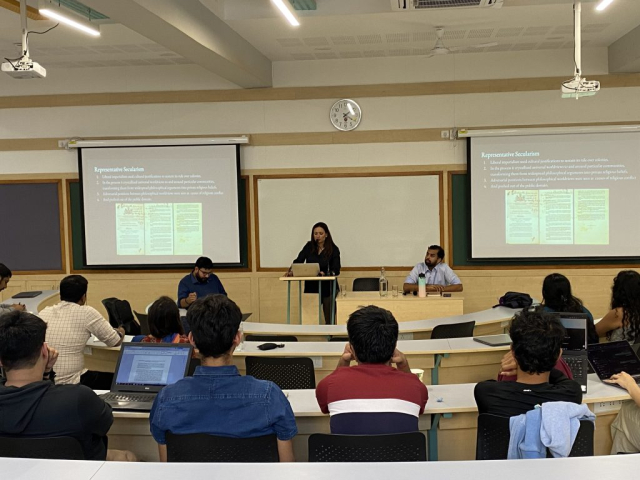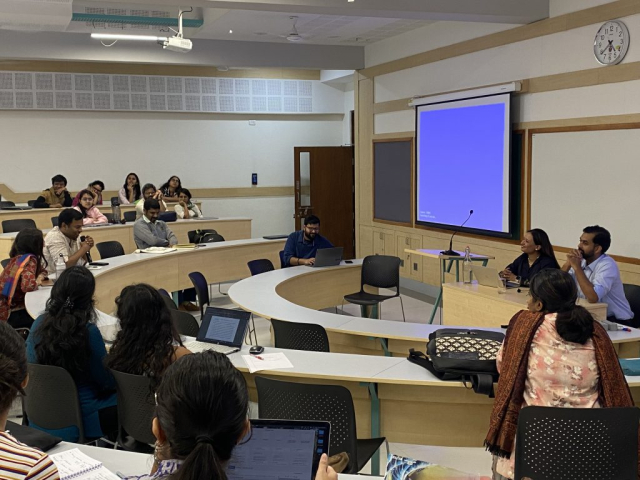M.K. Nambyar Chair | Talk on ‘Constitutionalism as the Language of Politics in India: Fraternity as the Key to Democracy’
NAB 204, NLSIU campus
Thursday, December 19, 2024, 3:50 pm
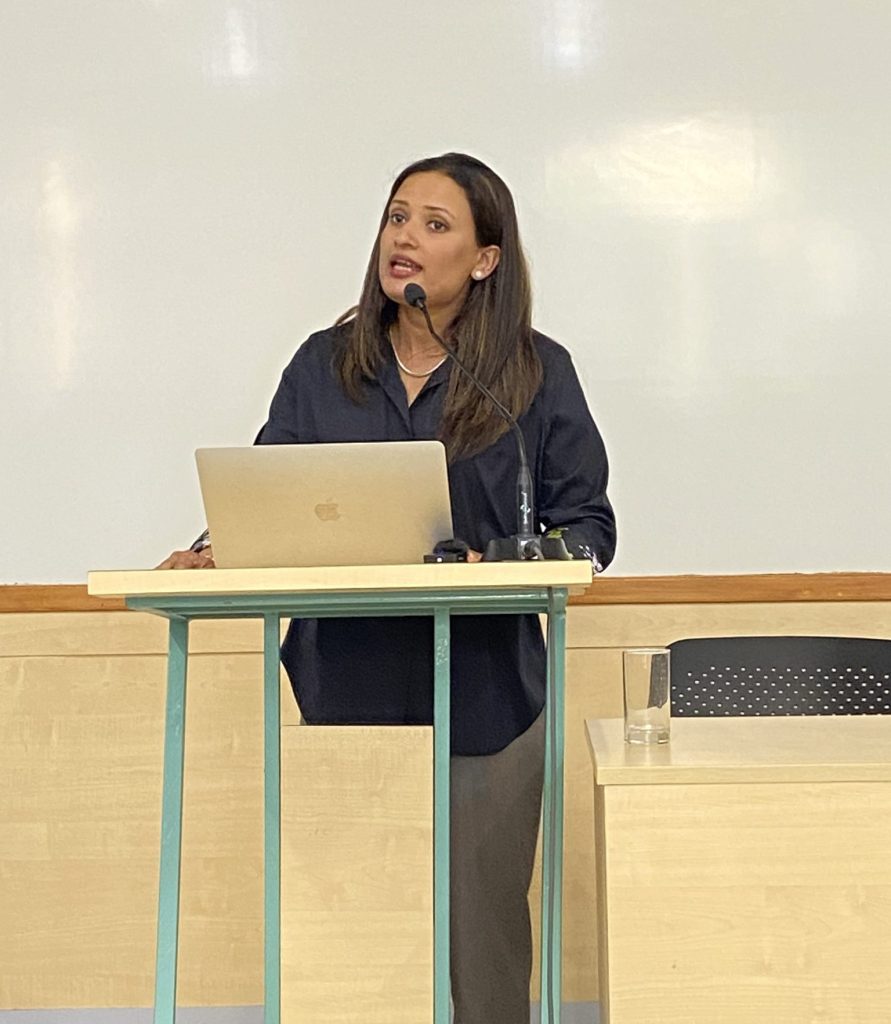 The MK Nambyar Chair on Constitutional Law is pleased to announce that Dr. Shaunna Rodrigues, Core Lecturer in Contemporary Civilization at Columbia University’s Middle Eastern, South Asian, and African Studies, will be delivering a lecture based on her paper titled ‘Constitutionalism as the Language of Politics in India: Fraternity as the Key to Democracy.’ The lecture is scheduled for 19th December from 3:50 pm-5:00 pm.
The MK Nambyar Chair on Constitutional Law is pleased to announce that Dr. Shaunna Rodrigues, Core Lecturer in Contemporary Civilization at Columbia University’s Middle Eastern, South Asian, and African Studies, will be delivering a lecture based on her paper titled ‘Constitutionalism as the Language of Politics in India: Fraternity as the Key to Democracy.’ The lecture is scheduled for 19th December from 3:50 pm-5:00 pm.
If you are interested in attending this event, please fill out this form.
Abstract of the Paper
Across elite and popular sites of democratic constitutionalism’s moment of creation in India, democracy was viewed as a mode of participation in shaping common laws, norms, and the life of a political community. However, there was also an understanding that this practice of democracy could progress in a postcolonial democracy like India if and when its diverse participants actively knew one another.
Political thinkers like B.R. Ambedkar and Abul Kalam Azad captured this principle of knowing others in order to enable greater participation in democracy through the concept of fraternity. In addition to identifying communication and association as valuable tools for building fraternity in India, they also systematically reflected on the moral and ethical frameworks needed in Indian public life to enable the deepening of knowledge of others in Indian democracy. These moral and ethical frameworks did not operate through secular conceptions of toleration. Instead, they employed non-secular yet plural frameworks, driven by a reconstruction of Buddhist and Islamic conceptions of fraternity, which emphasized identifying one’s own good in the good of others by sharing in and understanding the vital processes of their lives.
This paper outlines how their ideas of fraternity contribute to both elite and popular interpretations of constitutionalism as democracy unfolds in India to justify why knowledge of one another enables greater participation, and thus progress, in postcolonial Indian democracy. Further, it compares their conception of fraternity to Hindutva’s conceptions of the political community to assess the effectiveness of the former as a democratic counter to the latter’s majoritarianism in constitutionalism’s current moment of crisis in India. Finally, it assesses if and how overlaps and divergences between epistemically different non-secular conceptions of fraternity have implications for a pluralist conception of democracy in India.
About the Speaker
Dr. Shaunna Rodrigues is a Core Lecturer at the Core Curriculum in Contemporary Civilization, and the Department of Middle Eastern, South Asian, and African Studies at Columbia University, New York. She is a political theorist who uses historical methods to study how anticolonial ideas shape constitutionalism and the trajectories of democracy in postcolonial societies. She is currently working on her upcoming book, Anticolonial Constitutionalism: Fraternity, Progress, and Self-Respect in Indian Democracy. She has a BA in Economics from St.Stephens College, New Delhi, an M.A. in Political Studies from Jawaharlal Nehru University, New Delhi, and a Ph.D. in Middle Eastern, South Asian, and African Studies from Columbia University, New York.
Excerpts from the talk
On Constitutionalism in India
“Why and how does constitutionalism sustain itself as the primary language of politics in democratic India? I will argue that it does so because it is constantly being reconstructed in and through Indian democracy while grounding itself in sustained justifications produced for it during India’s anti colonial movement. Other scholars have argued that justifications for constitutionalism in India have relied on ideas of nationalism, secularism, freedom, and rights. In contrast, I will argue that secularism, freedom, and rights, while important, have, more often than not, been justifications employed by the Indian state to further its interpretation of constitutionalism in India. Unlike the Indian state, justifications for constitutionalism emerging from India’s people have not necessarily always employed secularism, freedom, or even nationalism as normative goals or realistic grounds for popular understandings of constitutionalism. Instead, justifications for constitutionalism emerging from the people in India have been shaped by ideas of self respect, progress, and fraternity. My presentation today will focus on fraternity as a major justification for constitutionalism in Indian democracy.”
On Abul Kalam Azad and Bhimrao Ambedkar conceptualization of ‘fraternity’
“I will proceed to show how figures like Abul Kalam Azad and Bhimrao Ambedkar conceptualized fraternity as an anti colonial response to representative secularism. Both Azad and Ambedkar’s systematic and anti colonial reflections on fraternity provide Indian democracy with enduringly relevant answers to how and why fraternity acts as an important justification of constitutionalism. I use their overlapping but distinct conceptions of fraternity to explore why fraternity is important for progress in India, where progress is imagined as a deepening of accumulated learning between and of different groups of people in Indian society. Simply put, fraternity as knowing the other has enabled progress in India because it deepens democracy by sustaining a pluralist political imaginary.”
“Abul Kalam Azad strongly believed that laws and the founding principles that laws would be grounded in ought to be substantiated by universal ideas so that they would appeal to a wide diversity of people. However, he critiqued the construction of universality by and around principles of liberalism alone and argued instead that universal principles could be drawn from other sources, including those that thrived in India prior to British imperial rule… According to him, fraternity comprised two things. First, it referred to social solidarity that allowed people to reach out to the other, understand the other, and side with the other despite their differences. Second, fraternity referred to the familiarity that different people felt with each other because of the assumptions they share about important involvements in common life despite their differences.”
“Ambedkar identified Buddhism’s emphasis on learning about others who shared one’s world as a practice of fraternity. Ambedkar defined fraternity using J.S. Mill who wrote of fraternity as a natural sentiment when an individual came to identify himself with the good of others. But he also added an additional meaning to this liberal utilitarian conception of fraternity. He asserted that fraternity is not preaching that we are children of god or the realization that one’s life is dependent on mothers. Two ideals that Ambedkar’s political rival, Mahatma Gandhi, consistently preached. Instead, the condition for growth of the sentiment of fraternity lies in sharing the vital processes of life. So I’m going to quote him here: “Fraternity strengthens social ties and gives to each individual a stronger personal interest in practically consulting the welfare of others. It leads him to identify his feelings more and more with their good or at least with any, you know, with an even greater degree of practical consideration for it. With the disposition to fraternity, he comes as to instructively to be conscious of himself as being one who, of course, pays regard to others.””
“I want to put forward a critical conception of progress that emerges from these two ideas of fraternity. Such a conception of progress is marked by the deepening of democracy that is aided in many moments by technological innovation and material expansion, but not defined by these indicators. What is central to this second conception of progress is the deepening of democracy within a polity through its enablement of emancipation from hierarchy. Such a conception of progress upholds the promise of inclusive participation, not only by making political institutions more representative of particularly diverse identities, but also by empowering a form of social learning across diverse groups within a polity. Progress driven by collective learning across different groups of each other’s norms, interests, pasts, and aspirations allows for diverse world views to be brought into the public domain and employed in the articulation of common political principles… This critical conception of progress grounding in learning from each other could produce an antidote to majoritarian conceptions of fraternity that also influence democracy in India.”
“For majoritarian conceptions of fraternity, loyalty is of utmost importance. Loyalty to what? Predominantly to a conception of the nation. However, Ambedkar’s argument, when combined with Azad’s argument, gives us a counter conception of fraternity where fraternity enables progressing together by associating with the goods of others who are different from others because we are part of a political community.”


